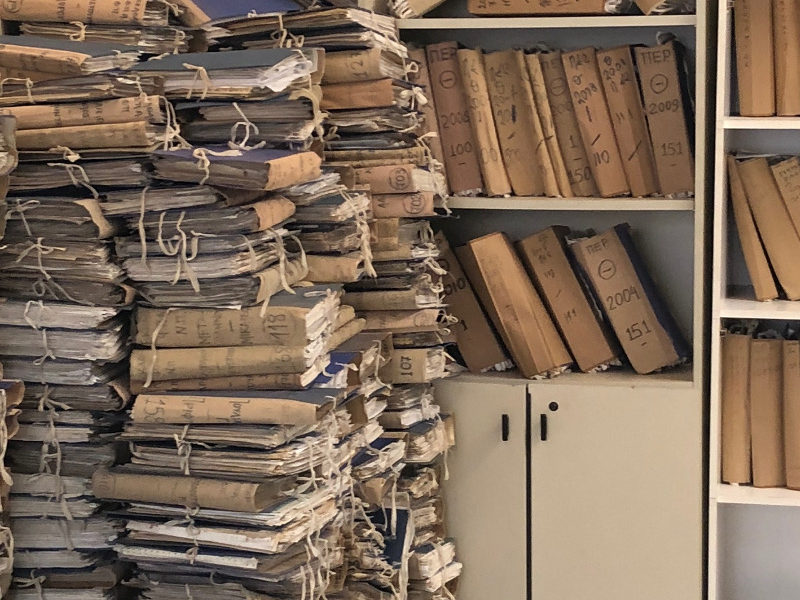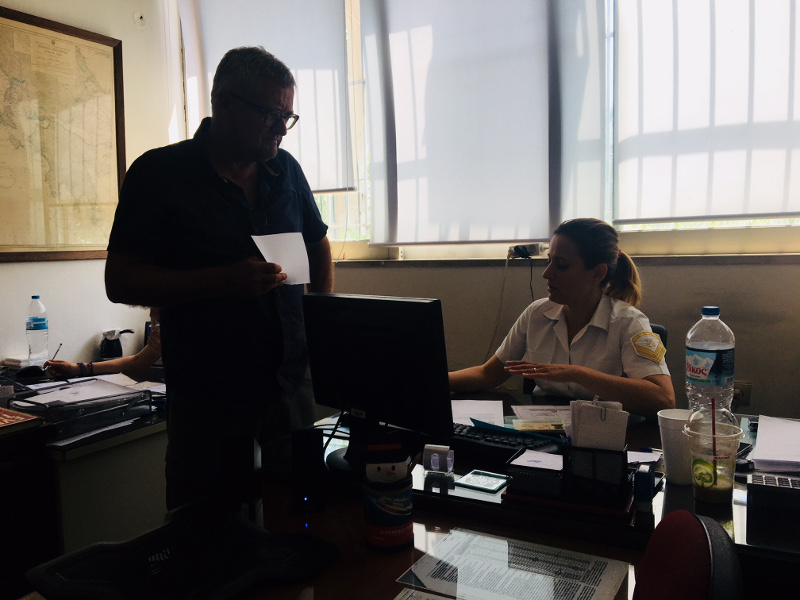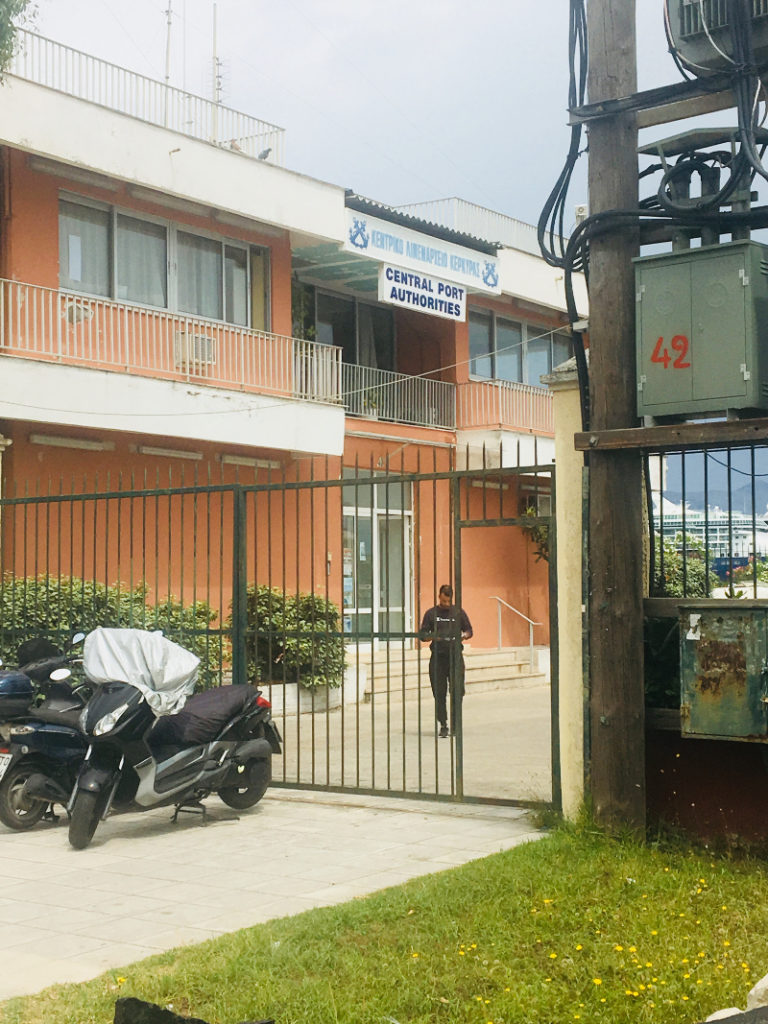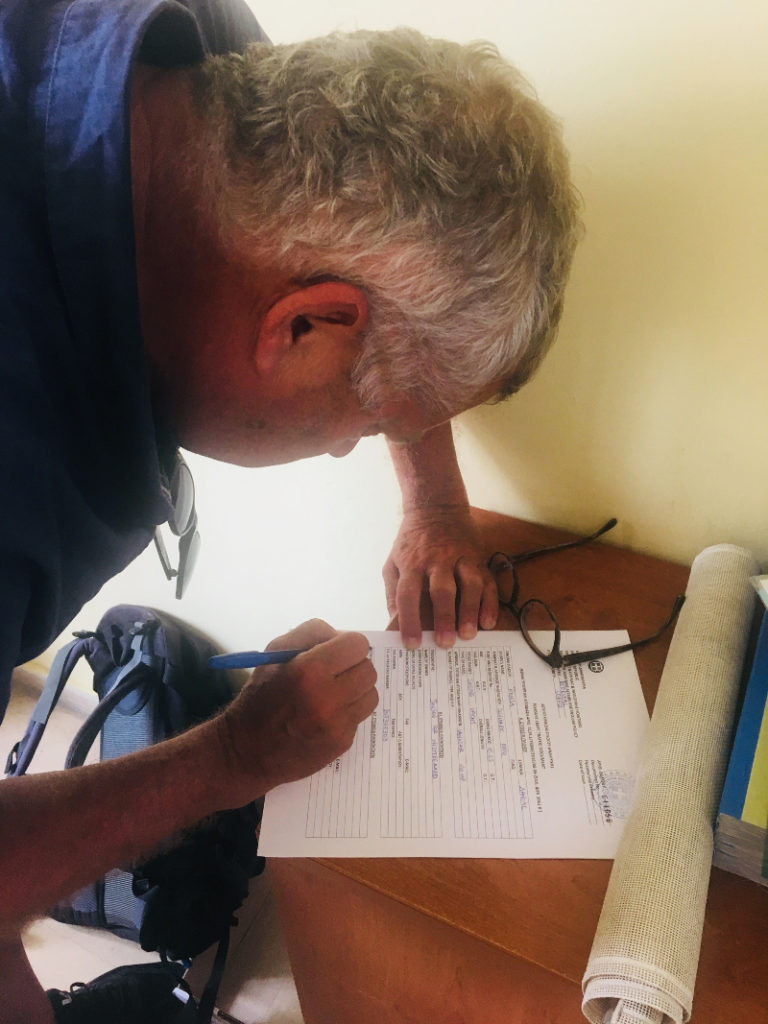Crossing between smiles and beautiful women, this is how you get a Greek sailing certificate

39° 37′ 48.9” N 19° 54′ 4.6944” E
May 17th
She is young, beautiful and absolutely professional when she – with only the hint of a smile – gives me the document, she just wrote, printed, stamped twice and signed once. “Here you are, Sir,” she says, explaining that the very first thing, that is going to happen is that I shall pay 15 euros to get into Greece.

First office. First day. At a time when I am not aware of how many offices, I have to visit to get my DEKPA-paper
I take 15 euros from my pocket and pass them to her.
“No, no. Not here. You must go to office number 5 in order to pay. Return to the lobby, take the next corridor and go into office number 5. Once you have paid, you can come back to me.”
I walk down the next corridor, knock on a closed door and find a sweating officer, who apparently is stabilizing huge stacks of meters of papers and folders standing on his office floor, and seeming to be able to overturn every moment.
I explain that I have come to pay him 15 euros. Without words he finds a date block, asking me to fill in a few fields, then he stamps and signs. I pay 15 euros and return to start – to the beautiful customs officer in office number 7.

In Corfu the harbour police and the customs share one building to receive new sailors into Greece. Does that make it more easy for the sailors? That is yet to be proven
I am moving around in the Central Port Authority of Corfu, where customs and port police reside, and I am trying to get a so-called DEKPA document, which any foreign leisure boat over ten meters must have in order to sail in Greece waters.
“Well done,” nods the beautiful speaker acknowledging and accepts the receipt, that I have paid 15 euros. “Now hear this,” she explains. “The document I have made today is a temporary document, because you should have actually been at the tax office in Corfu Town to pay 50 euros for your DEKPA-certificate, and then you should have returned to me, and we could have finished the final document.”
But it is two o’clock, she explains. And at two o’clock p.m. the tax office closes. She gives me a Cyrillic city map, showing that the tax office is two kilometers from the Central Port Authority.
“Come back again tomorrow to office number 7, after you’ve been at the tax office,” she smiles.
Next morning I start at 9.30. I have entered the tax office’s address in Google Maps and I am led to a large, square building, that might look like a tax office. I enter through one of the two main entrances of the building and hope, it will lead me to the tax office.
All signposts are written in Greek with Cyrillic letters, I draw a number, get a seat in the waiting room, and when it is my turn, I walk freshly to the desk and ask in English: “Is this the tax office?”
No, the woman in the desk explains me kindly. “You must enter through the other main entrance of the building and go straight on to the first floor.”
How nice, I’m on track! On the first floor, I go down a corridor, still I have no clue of the Greek names for the task of each office, so I knock on the door to office number 1 and ask if they are the tax office? A woman explains that yes, they are, but the errand I come in, must be solved at office number 11, down the corridor, on the left.
I ask a few Greeks outside office number 11, if they are in line, but they shake their heads indicating, that they do not understand English. I am waiting patiently until I see that standing in a line, is not a core competence of the Greek people. New people show up, bust into the office directly, and when they discover that the office is busy, they back out and take the front position of the queue.
I’m making myself wide as a door, trying to fill the entire doorway as a signal, that I am hard to pass. While I wait, I study the office. Five women are in the office working with huge stacks of papers. They do have computers, but the computer-mouse is parked on top of the keyboard, and the tool they use most is the kind of fungus used to keep your finger wet, when you browse through many papers. Fascinating! I have not seen such a fungus on a desk for 30 years!
Only one of the women in the office is working with the citizens in the queue. At one point she comes past me and sees me standing in the doorway with my document in my hand. She looks at the document and says, that it’s completely wrong. They do not handle that kind of business number 11. I have to get back, enter another corridor just before the stairs. There they will be able to handle my case.
Thanks, I say, and then I go and find a huge office with lots of counters, but again not one sign to tell me where to go. I ask the first desk employee I meet, and she points me two counters further. “Number two employee from here. She is not here right now. But she’s coming soon. Just wait “.
I take my place in the queue in front of the empty counter and spend the time observing Greek office life. A man empties the rest of his coffee into a plant and goes to the coffee machine to pick up a new one. Another man looks a little to the right and then to the left, collects his cigarettes and matches and goes purposefully towards the exit.
Outside the windows a group of high school students are training a march with flutes, drums and a flag in front. All the tax office employees run to the windows to photograph. Something interesting is happening.
My “case manager” arrives. “Sorry, but my system is down,” she explains, and after some time of waiting she finally gets in touch with her IT-system again and prints my wish to pay 50 euros to the Greek tax authorities for a DEKPA-proof, and relieved I take 50 euros out of my pocket and hand them over to her.
“Not here,” she kindly explains. “You have to go to the cashier to pay.”
“She explains where the cashier is, and when I go to the cashier, she puts another six-seven stamps on the paper, takes my 50 euros, and then I go back to my “case-manager”, showing that I have paid 50 euros to the Greek tax office.
“Are we done?” “Yes, that was it.” More smiles.
Yes! I feel my document is within reach, and I hurry through Corfu Town down to the Central Port Authority to get my DEKPA proof. I open the door to office number 7 and safe of victory declares: “Here I have the proof, that I have paid 50 euros!”
The people in the office are different than yesterday and the new ones are skeptical to my tax document.
“You need to go to office number 8. We can’t issue the document, before it is approved by office number 8.
“I open the door to office number 8, where two port police officers reside. I’m addressing the female officer, once again a beautiful young woman in chic white uniform-skirt, white shoes and white uniform blouse. Again, the woman shows up to be highly professional and strongly accustomed to compliance with rules.
She wants to see my registration certificate for the boat.
“Well, I showed that to your colleague yesterday. Now I do not have it anymore, it lies with the port-manager of Port Mandraki. ”
“Sorry. I can not issue a DEKPA-certificate, if I do not see your registration certificate.”
I try to tell her about my passport, my insurance papers and documentation for yacht skipper- and VHF-training. But nothing could interest her less.
“Sorry. Registration Certificate!
“But listen, there are several kilometers to Port Mandraki!”
“Yes,” smiles the officer. “But we’re open all day. You can come back in the late afternoon.”
Smiles and beautiful women. I choose to smile as well, while I swear inside myself of the prehistoric bureaucracy of the Greeks.
Later, both Kirsten and I return with the registration certificate, opens the door to office number 8 and announces that we are back – this time with the registration certificate.
Then the writing begins. A DEKPA-paper is obviously a many pages long document. The officer completes something, I fill in some of the blanks.

Quite a lot of the work you have to do yourself, but that seems okay. Precision is important
Finally, the paper gets four stamps, two signatures and it is copied. “Now you can go back to office number seven!”
At office number seven, there has been a shift of staff in the meanwhile, and the new customs officer does not know my case. She starts all over again. Certificate of registration, insurance, passport. It all gets copied. Questions are answered. The importance of the paper explained. Be sure to get it approved again in a year!
Thank you, thank you. We have passed the needle eye. After two half days, seven offices, a plethora of stamps, signatures, photocopies, an incomprehensible bureaucracy added with kindness and smiles, we now have a DEKPA proof.
The system has welcomed us to Greece, and the waters of the Greek islands is said to be the most beautiful, hospitable and enjoyable sailing ground in the world.
We are looking so much forward.